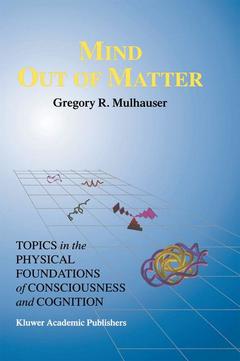Mind Out of Matter, 1998 Topics in the Physical Foundations of Consciousness and Cognition Studies in Cognitive Systems Series, Vol. 20
Langue : Anglais
Auteur : Mulhauser G.R.

Mind Out of Matter aims to transform the way we think about consciousness and the physical world. Unlike many contemporary volumes, it develops a robust and philosophically satisfying account of the mind/body relationship without doing violence to fundamental physics. It expunges popular but ludicrous assumptions about the `in principle' capabilities of cognizers and, with the help of tools from mathematics and scientific fields, supplants flawed notions of representation, function, and mental state with objective and physically grounded alternatives. It debunks quantum theories of consciousness, constructs a simple zombie recipe, and evaluates recent research on chaotic analogue networks. This book is indispensable for readers in philosophy of mind, cognitive science, and artificial intelligence, and for mathematicians applying complexity theory or information theory to biological cognition.
Audience: General academic/university libraries, plus university departmental libraries in philosophy, artificial intelligence, cognitive science, and computer science. Researchers and specialists in philosophy of mind, cognitive science, artificial intelligence, artificial life, complexity theory, and information theory. Researchers in the telecommunications industry.
Audience: General academic/university libraries, plus university departmental libraries in philosophy, artificial intelligence, cognitive science, and computer science. Researchers and specialists in philosophy of mind, cognitive science, artificial intelligence, artificial life, complexity theory, and information theory. Researchers in the telecommunications industry.
One: Frontal Assault.- 1. Structure and Overview.- 2. Underlying Themes and Methods.- 3. Cognitive Dissonance.- Two: Zombies and Their Look-Alikes.- 1. An Embarrassment to Our Discipline.- 2. Building A Zombie.- 3. Zombies, Functions, and Mathematical Mysticism.- Three: Information, Complexity, and Representation.- 1. Information is Physical.- 2. Measuring Information.- 3. Grounding Representation.- 4. GöDEL DE-MYSTIFIED.- 5. Platonic Hell.- Four: A Rose, by any other Name (or Description).- 1. Sensations and Descriptons—Preliminaries.- 2. Getting Sensations from Descriptions.- 3. ‘Macmary’.- 4. A Tasty Side Note.- 5. The Third Person Problem.- Five: Functional Systems.- 1. Liberal Functionausm.- 2. Logical Depth Measures.- 3. Choosing Modules by Minimising Complexity.- 4. Broader Concerns about Functional Decomposition.- Six: Self Models.- 1. Supervenience and Levels of Explanation.- 2. Prelude to a Theory of Consciousness.- 3. Troubles with ‘Mental States’.- 4. Capturing Consciousness.- 5. Inside the Self Model.- Seven: Schrödinger’s Cat is Dead.- 1. Two Problems of Interpretation.- 2. Quantum Formalism in a Nutshell.- 3. Consistent Histories.- 4. The Classical Approximation.- 5. Interactive Decoherence.- 6. Is This a Fapp?.- 7. mind—what’s QM Got to Do With it?.- Eight: Building Conscious Data Structures.- 1. Information and the Self Model.- 2. Representation and Function in Neural Systems.- 3. Grossberg’s Adaptive Resonance Theory.- 4. Circuits of the Self Model.- Nine: Chaos, Computabiltty, and Real Life.- 1. Too Much of a Good Thing?.- 2. Models and Computation.- 3. Dynamical Systems.- 4. Chaotic Systems.- 5. Extended Computabjlity.- 6. Computability and Chaotic Analogue Systems.- 7. Chaos And Cognition In Real Life.- Ten: My ‘Hidden’Agenda.- 1. What Good is a Theory of Mend And Body?.- 2. A Partial Picture In Soft Focus.- 3. Philosophical Futures.- References.
Professional endorsements:'You've read the rest, now try the best. Mulhauser takes on a wild safari tour of the outer limits of mind science. There are a lot of dangerous ideas out there, many a good mind has come back worse for the encounter. Mulhauser's technical sophistication and philosophical sensitivity make him the ideal guide. No metaphysical snake-oil here, just unswerving good sense at the frontiers of cognitive science.'Tim van Gelder, University of Melbourne'One of the first serious applications of algorithmic information theory, fun to read!'G.J. Chaitin, IBM T.J. Watson Research Center'Though I still regard myself to live in what Mulhauser calls 'Platonic Heaven' (he would place me - as someone who believes that my mental gymnastics go beyond the physical and the computable - in 'Platonic Hell'), reading his book was an absolute joy. It is a remarkable blend of technical know-how, smooth prose, and stimulating examples. This book can give readers command over the relevant formal landscape, while simultaneously engaging them in good old-fashioned philosophical reflection.'Selmer Bringsjord, Rensselaer Polytechnic Institute'We all know that chaos, neural nets, and consciousness must be connected. Mulhauser's challenging book gives us the first thought-out account of what the connections could be.'Adam Morton, University of Bristol'It is engagingly written, and Mulhauser is well informed, acute, and enthusiastic.'Robert Kirk in Philosophical Books, July 2000
Date de parution : 10-2012
Ouvrage de 291 p.
15.5x23.5 cm
Thème de Mind Out of Matter :
© 2024 LAVOISIER S.A.S.


